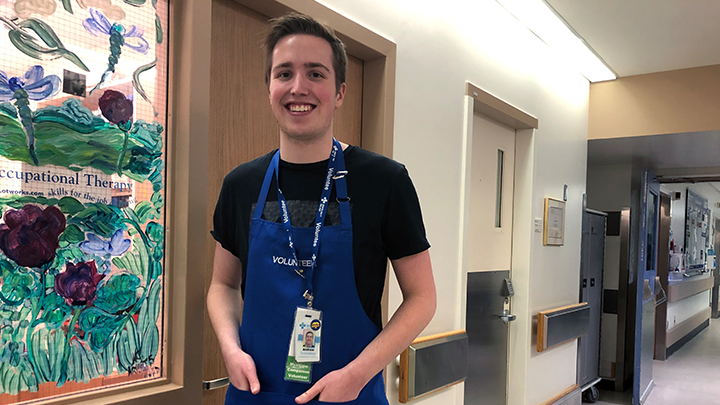
January 7, 2019

Andrew Panteluk, a third-year honours science student in immunology, is a volunteer with the Mealtime Companion Program. The program aims to tackle malnutrition and safety for patients by having volunteers assist with opening containers, cutting up food and providing friendly conversation.
Story & photo by Vanessa Gomez
EDMONTON — For the able-bodied, cutting up food and enjoying the social aspects of eating are often taken for granted. But for some patients in hospital, isolated from their home environment and facing physical limitations, their meals go unfinished, which can lead to malnutrition.
But help is at hand thanks to the Mealtime Companion and Quality Improvement Program at the University of Alberta Hospital (UAH), which is expanding to new units to tackle malnutrition and safety during mealtimes for their patients.
Program volunteers make rounds during mealtimes where they assist patients with cutting up food and opening packages, and provide friendly conversation.
“Not all patients have family members who are able to come in during mealtimes,” says volunteer Andrew Panteluk. “Having someone come in and sit with patients to assist with meals and provide that companionship is really helpful. It breaks up their day a little bit and gets them out of their rooms.”
Patients who feel uncomfortable, stressed or sad about their situation may not finish all their meals — and having to struggle to open containers, cut up their food or add cream to a cup of coffee only adds to their feelings of helplessness.
“Improving nutrition requires a multifaceted approach,” says Joao Margadinho, a dietitian at the UAH.
“Volunteers get a sense of what patients like and dislike. They’re able to make them feel comfortable so they can enjoy their meals, while nurses and dietitians are able to deal with the medical needs of patients. In dealing with malnutrition, we can improve a patient’s overall health.”
On top of providing company, volunteers who spot any sign of distress can call nurses for assistance, making care timelier.
“If I see something that’s abnormal — or something that can potentially impact their care — I will let the charge nurse know,” says Panteluk. “The staff are very busy during mealtimes, so if they can’t spend a certain amount of time with a patient, we can fill that gap.”
“Our volunteers involved in this program show immense compassion for our patients; they demonstrate their caring by bringing suggestions back to their own team and they show a lot of confidence and independence when stepping onto a busy inpatient unit,” says Nicole Veronovici, Manager of Site Operations at the UAH and an integral leader in overseeing volunteers and making the program a reality. Volunteers in the Mealtime Companion Program have also found the experience rewarding.
“We’ve had family members who come up to us and say ‘Wow, they’ve eaten so much today — and this is the first time!’ says Panteluk.
“After they get to eat, they’re almost an entirely different person. Seeing that improvement in patients is my favourite part of this program.”